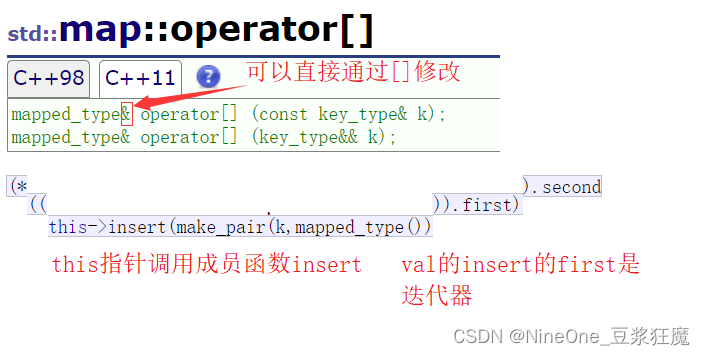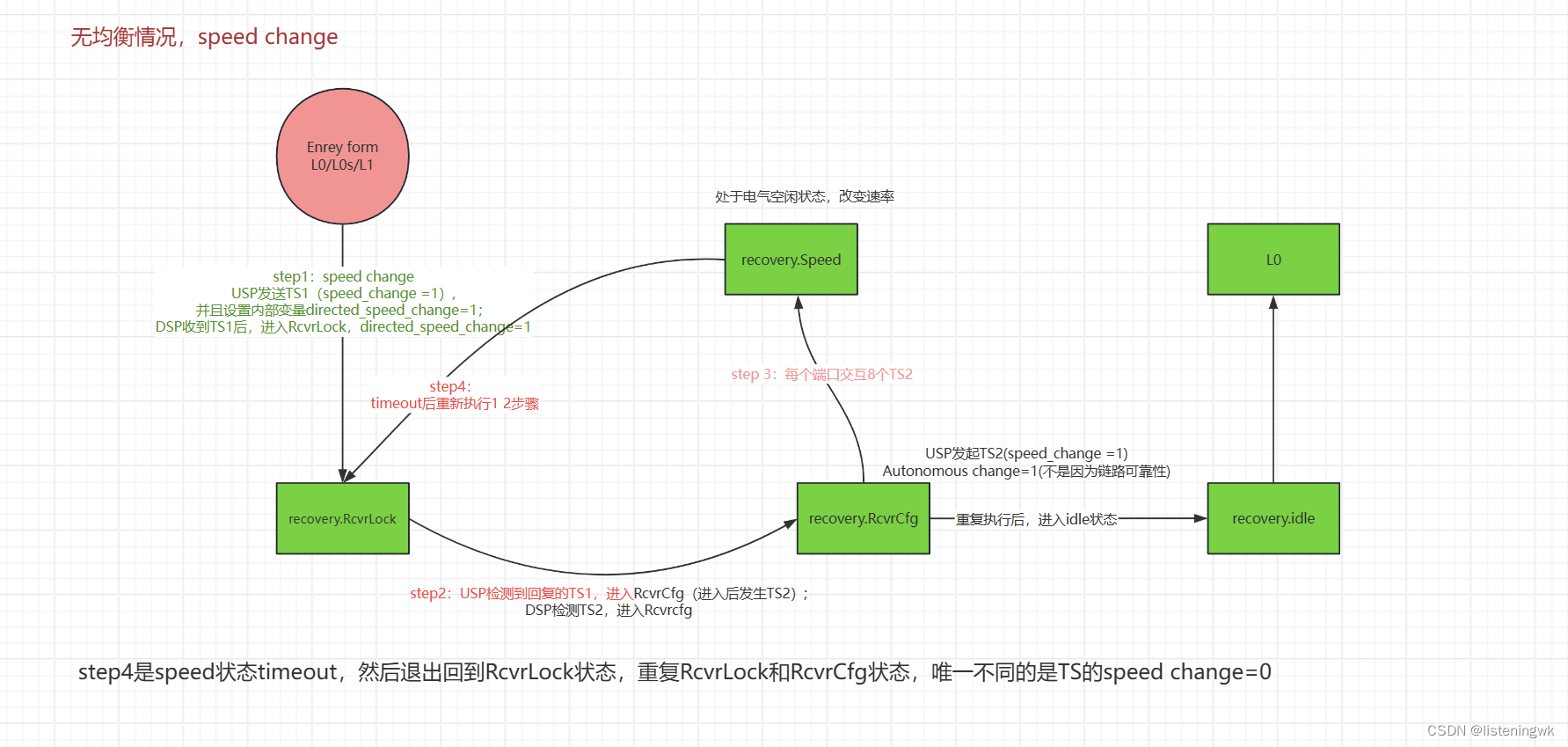目录
RBTreeNode的声明
RBTree结构
map结构
set结构
改造红黑树
迭代器类
迭代器成员函数
默认成员函数
Insert
set
map
RBTreeNode的声明
template<class T>
struct RBTreeNode
{
RBTreeNode<T>* _left;
RBTreeNode<T>* _right;
RBTreeNode<T>* _parent;
T _data;
colour _col;
RBTreeNode(const T& data)
: _left(nullptr)
, _right(nullptr)
, _parent(nullptr)
, _data(data)
, _col(RED)
{}
};RBTree结构
template<class K, class T, class KeyOfType>
class RBTree
{
typedef RBTreeNode<T> node;
public:
typedef __RBTreeIterator<T, T&, T*> Iterator;
typedef __RBTreeIterator<T, const T&, const T*> ConstIterator;
private:
node* _root = nullptr;
};map结构
namespace nineone
{
template<class K, class V>
class map
{
struct keyofmap
{
const K& operator()(const pair<K, V>& kv) const
{
return kv.first;
}
};
public:
private:
RBTree<K, pair<const K, V>, keyofmap> rbt;
};
}set结构
namespace nineone
{
template<class K>
class set
{
struct keyofset
{
const K& operator()(const K& lhs) const
{
return lhs;
}
};
public:
private:
RBTree<K, const K, keyofset> rbt;//这里没有const find说类型不对
};
}- mapset通过组合的方式复用RBTree
- 第二个模板参数是用来决定RBTree数的类型
- 第三个模板参数是为了拿出T里的键,是去实例化的对象的变量里,就是node里的_data
- 那不是有T和KeyOfType,为什么还需要第一个模板参数呢?因为作为成员函数形参的时候没法从T里拿出K,比如Find就要传进K进去
解释const
- keyofmap是一个仿函数,用对象去调用,核心部分是operator()操作符的重载
- 第一个const,为了防止返回的值被改变,从而对一个调用这个仿函数的函数,出现不被预期的结果
- 第二个const,为了可以使const对象也可以调用
- 第三个const,是为了防止 keyofmap 类成员函数的改变,那这类现在不是没有吗?这个仿函数的目的就是为了取出对应的K,建议看effectivC++
改造红黑树
迭代器类
template<class T, class Ref, class Ptr>
struct __RBTreeIterator
{
typedef RBTreeNode<T> node;
typedef __RBTreeIterator<T, Ref, Ptr> Self;
node* _node;
__RBTreeIterator( node *const n)
:_node(n)
{}
Ref operator*()
{
return _node->_data;
}
Ptr operator->()
{
return &_node->_data;
}
bool operator!=(const Self& self)
{
return _node != self._node;
}
Self operator++(int)
{
Self ret = *this;
++*this;
return ret;
}
Self operator++()
{
if (_node && _node->_right != nullptr)
{
node* minright = _node->_right;
while (minright->_left)
{
minright = minright->_left; //果然,这里写错成_right了
}
_node = minright;
}
else
{
node* cur = _node;
node* parent = cur->_parent;
while (parent && parent->_right == cur)
{
cur = parent;
parent = parent->_parent;
}
_node = parent;
}
return *this;
}
};- Ref对应的是T& 或者const T&;Ptr对应的是T* 或者const T*
- 这是用一个类来封装node*指针,用类对象来使用迭代器
- 构造里的const;指针是有两部分,第一是指针自身,第二是自己所指向的内容,★也就是说读写的有两部★;一个总结,const往左边找,左边没有往右边找,靠近哪个,哪个就是常量;node* const n这样写是为了防止传进来的指针被改变;如果是const node* n或node const * n那么是指针所指向的内容不能被改变,关键点是:这个指针所指向的内容是常量;而_node是一个读写指针指针,_node所指的内容和指针自身是可以改变的
operator++
- 走到中序的下一个位置
- 中序是左子树 根 右子树 ;过当前节点右不为空,就要去找右树的最左节点;如果为空,就说明这个节点走完了,回去看父亲,如果父亲的左指向他,那么父亲这个节点还没走,如果父亲的右指向他,说明父亲节点走完,要向上找,知道找到一个节点,使得parent的left等于cur
- 注意 对指针的解引用之前,最好提前判空
迭代器成员函数
public:
Iterator Begin()
{
node* minleft = _root;
while (minleft && minleft->_left)
{
minleft = minleft->_left;
}
return Iterator(minleft);
}
Iterator End()
{
return Iterator(nullptr); //要有构造
}
ConstIterator Begin() const
{
node* minleft = _root;
while (minleft && minleft->_left)
{
minleft = minleft->_left;
}
return ConstIterator(minleft);
}
ConstIterator End() const
{
return ConstIterator(nullptr); //要有构造
}默认成员函数
public:
RBTree() = default;
RBTree(const RBTree<K, T, KeyOfType>& copy)
{
_root = Copy(copy._root);
}
RBTree& operator=(RBTree<K, T, KeyOfType> rbt)
{
swap(_root, rbt._root);
return *this;
}
~RBTree()
{
Destory(_root);
_root = nullptr;
}
private:
void Destory(node* root)
{
if (root == nullptr)
return;
Destory(root->_left);
Destory(root->_right);
delete root;
}
node* Copy(node* root)
{
if (root == nullptr)
{
return nullptr;
}
node* newnode = new node(root->_data);
newnode->_col = root->_col;
newnode->_left = Copy(root->_left);
if (newnode->_left)
newnode->_left->_parent = newnode;
newnode->_right = Copy(root->_right);
if (newnode->_right)
newnode->_right->_parent = newnode;
return newnode;
}类和对象
- 这里必须要提供默认构造,因为成员变量声明的时候不能使用()来初始化;为了提供更清晰的内存管理和初始化顺序,成员变量的初始化必须在初始化列表或者构造函数体内,
- 构造函数一定不能是const函数,因为他就是为了初始化用的
- 赋值重载 这里一定要是swap(_root, rbt._root);不能是 _root = rbt._root;因为这个rbt是一个传值传参,出了这个函数就会被调析构;一定要传引用返回,不然又会调拷贝构造;一定要有返回值,目的是为了可以连续赋值
代码
- 析构的时候用后序析构
- 拷贝的时候,不要忘记子连接回父
Insert
pair<Iterator, bool> Insert(const T& data)
{
if (_root == nullptr)
{
_root = new node(data);
_root->_col = BLACK;
return make_pair(Iterator(_root), true);
}
KeyOfType keyoftype;
node* cur = _root;
node* parent = cur;
while (cur)
{
if (keyoftype(cur->_data) < keyoftype(data))
{
parent = cur;
cur = cur->_right;
}
else if (keyoftype(cur->_data) > keyoftype(data))
{
parent = cur;
cur = cur->_left;
}
else
{
return make_pair(Iterator(cur), false);
}
}
cur = new node(data);
node* newnode = cur;
if (keyoftype(parent->_data) < keyoftype(data))
{
parent->_right = cur;
}
else
{
parent->_left = cur;
}
cur->_parent = parent;
while (parent && parent->_col == RED)
{
node* pparent = parent->_parent;
if (pparent->_left == parent)
{
node* uncle = pparent->_right;
if (uncle && uncle->_col == RED)
{
parent->_col = BLACK;
uncle->_col = BLACK;
pparent->_col = RED;
cur = pparent;
parent = pparent->_parent;
}
else
{
if (parent->_left == cur)
{
rotateR(pparent);
//cur->_col = RED;
parent->_col = BLACK;
pparent->_col = RED; //这个之前一定是黑
}
else
{
rotateL(parent);
rotateR(pparent);
cur->_col = BLACK;//这竟然写错了
pparent->_col = RED;
}
break;
}
}
else
{
node* uncle = pparent->_left;
if (uncle && uncle->_col == RED)
{
uncle->_col = BLACK;
parent->_col = BLACK;
pparent->_col = RED;
}
else
{
if (parent->_right == cur)
{
rotateL(pparent);
parent->_col = BLACK;
pparent->_col = RED;
}
else
{
rotateR(parent);
rotateL(pparent);
cur->_col = BLACK;
pparent->_col = RED;
}
break;
}
}
_root->_col = BLACK;
}
return { Iterator(newnode), true };
}- 返回值的变化,和取值的变化
- 取值可以用 KeyOfType 的匿名对象来取
代码
- return 也可以:pair<Iterator, bool>(newnode, true); or make_pair(Iterator(newnode), true) or make_pair(newnode, true),不建议最后一种写法;effectiv C++建议:应该尽量避免隐式类型转换,以防止潜在的错误和难以维护的代码;回过来看,第三种因为 iterator是一个node*的封装,而不是node*
- 列表初始化:一个重要特性是防止窄化转换,比如 防止double 变成 int ;防止隐式类型转换还是要使用explicit
- explicit只能用于修饰构造函数或转换运算符;explicit operator int() const{}这是转换运算符(隐式转换运算符)
- 不能传引用返回,因为return的是一个临时对象,出作用域会被销毁,导致悬空引用;make_pair也是传值返回,因为他是返回的是pair的匿名对象
set
namespace nineone
{
template<class K>
class set
{
struct keyofset
{
const K& operator()(const K& lhs) const
{
return lhs;
}
};
public:
typedef typename RBTree<K, const K, keyofset>::Iterator iterator;
typedef typename RBTree<K, const K, keyofset>::ConstIterator const_iterator;
iterator begin()
{
return rbt.Begin();
}
iterator end()
{
return rbt.End();
}
const_iterator begin() const
{
return rbt.Begin();
}
const_iterator end() const
{
return rbt.End();
}
pair<iterator, bool> insert(const K& k)
{
return rbt.Insert(k);
}
iterator find(const K& key)
{
return rbt.Find(key);
}
private:
RBTree<K, const K, keyofset> rbt;
};
}解释
- 通过组合的方式,用RBTree来封装set,隐藏RBTree类实现细节,提供用户简洁的接口
- typedef前面一定要加 typename;没有实例化的类模板去取内嵌类型,是有异议的,编译器不知道这是成员函数名还是成员变量;iterator一定要是public,因为要在类外使用,对于RBTree里的别名同理
解释:两个别名和成员变量的第二个模板参数必须一样★
- 前提要点,不同类型参数实例化的类模板被视为不同类型,所以不能直接转换(编译器不提供隐式类型转换);
- 这三个只要有一个不一样就会报类型无法转换的错误;报错的地方在insert或者find return的地方
- 我写文章的时候再次调试,报错的地方是对的,在const_iterator end() const这里报错,就是这里,返回语句的地方;因为这个rbt对象构建的树节点的K,是const K类型;但是const_iterator的树节点类型是K,导致返回类型与返回语句的类型不一样,且类型不兼容★
- 如果函数的返回类型与声明里的返回类型无法隐式类型转换(类型不兼容),编译器就会报错
解释:第二个模板参数
- 这个模板参数作用到的是节点和迭代器
- 但是在ConstIterator里后面两个模板参数不是有const了;编译器会自动去掉多余的const,但是你自己多加会编译报错
- 第二个参数是const,那么迭代器里,_node的类型是RBTreeNode<const T>*,这是一个普通指针;于指针而言,可以指向不同的RBTreeNode<const T>对象;与对象而言,对象里有部分是可以改变的,只有_data是const;const RBTreeNode<const T>*这样才是一个常量指针
- 所以_node不会因为T为const导致++不能使用
map
namespace nineone
{
template<class K, class V>
class map
{
struct keyofmap
{
const K& operator()(const pair<K, V>& kv) const
{
return kv.first;
}
};
public:
typedef typename RBTree<K, pair<const K, V>, V>::Iterator iterator;
typedef typename RBTree<K, pair<const K, V>, V>::ConstIterator const_iterator;
pair<iterator, bool> insert(const pair<K, V>& kv)
{
return rbt.Insert(kv);
}
iterator find(const K& key)
{
return rbt.Find(key);
}
V& operator[](const K& key)
{
pair<iterator, bool> ret = rbt.Insert(make_pair(key, V()));
return ret.first->second;
}
iterator begin()
{
return rbt.Begin();
}
iterator end()
{
return rbt.End();
}
const_iterator begin() const
{
return rbt.Begin();
}
const_iterator end() const
{
return rbt.End();
}
private:
RBTree<K, pair<const K, V>, keyofmap> rbt;
};
}解释insert








![[OpenGL] opengl切线空间](https://img-blog.csdnimg.cn/direct/d9f9b4cdabc44eb98c3f14a8a93b68e5.png)










